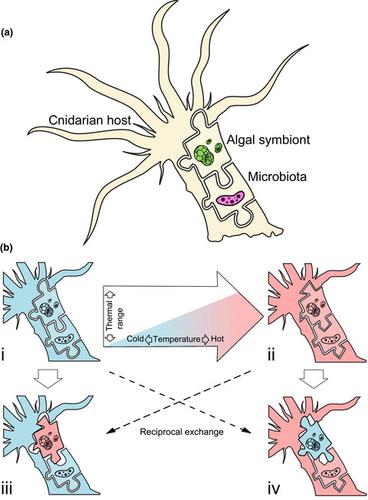当前位置:
X-MOL 学术
›
Glob. Change Biol.
›
论文详情
Our official English website, www.x-mol.net, welcomes your
feedback! (Note: you will need to create a separate account there.)
Unfamiliar partnerships limit cnidarian holobiont acclimation to warming.
Global Change Biology ( IF 10.8 ) Pub Date : 2020-07-06 , DOI: 10.1111/gcb.15263 Marcela Herrera 1 , Shannon G Klein 2 , Sebastian Schmidt-Roach 1 , Sara Campana 1 , Maha J Cziesielski 1 , Jit Ern Chen 1 , Carlos M Duarte 2 , Manuel Aranda 1
Global Change Biology ( IF 10.8 ) Pub Date : 2020-07-06 , DOI: 10.1111/gcb.15263 Marcela Herrera 1 , Shannon G Klein 2 , Sebastian Schmidt-Roach 1 , Sara Campana 1 , Maha J Cziesielski 1 , Jit Ern Chen 1 , Carlos M Duarte 2 , Manuel Aranda 1
Affiliation

|
Enhancing the resilience of corals to rising temperatures is now a matter of urgency, leading to growing efforts to explore the use of heat tolerant symbiont species to improve their thermal resilience. The notion that adaptive traits can be retained by transferring the symbionts alone, however, challenges the holobiont concept, a fundamental paradigm in coral research. Holobiont traits are products of a specific community (holobiont) and all its co‐evolutionary and local adaptations, which might limit the retention or transference of holobiont traits by exchanging only one partner. Here we evaluate how interchanging partners affect the short‐ and long‐term performance of holobionts under heat stress using clonal lineages of the cnidarian model system Aiptasia (host and Symbiodiniaceae strains) originating from distinct thermal environments. Our results show that holobionts from more thermally variable environments have higher plasticity to heat stress, but this resilience could not be transferred to other host genotypes through the exchange of symbionts. Importantly, our findings highlight the role of the host in determining holobiont productivity in response to thermal stress and indicate that local adaptations of holobionts will likely limit the efficacy of interchanging unfamiliar compartments to enhance thermal tolerance.
中文翻译:

不熟悉的伙伴关系限制了刺胞动物全生物对变暖的适应。
增强珊瑚对气温升高的适应能力现在是一个紧迫问题,导致人们越来越多地探索利用耐热共生物种来提高其热适应能力。然而,仅通过转移共生体就可以保留适应性特征的观点挑战了全生物概念,这是珊瑚研究的基本范式。全生物特征是特定群落(全生物)及其所有共同进化和局部适应的产物,这可能通过仅交换一个伙伴来限制全生物特征的保留或转移。在这里,我们使用源自不同热环境的刺胞动物模型系统 Aiptasia(宿主和共生科菌株)的克隆谱系来评估交换伙伴如何影响全生物在热应激下的短期和长期表现。我们的结果表明,来自热变化较大的环境的全生物对热应激具有更高的可塑性,但这种弹性不能通过共生体的交换转移到其他宿主基因型。重要的是,我们的研究结果强调了宿主在决定全生物响应热应激的生产力中的作用,并表明全生物的局部适应可能会限制交换不熟悉的区室以增强耐热性的功效。
更新日期:2020-07-06
中文翻译:

不熟悉的伙伴关系限制了刺胞动物全生物对变暖的适应。
增强珊瑚对气温升高的适应能力现在是一个紧迫问题,导致人们越来越多地探索利用耐热共生物种来提高其热适应能力。然而,仅通过转移共生体就可以保留适应性特征的观点挑战了全生物概念,这是珊瑚研究的基本范式。全生物特征是特定群落(全生物)及其所有共同进化和局部适应的产物,这可能通过仅交换一个伙伴来限制全生物特征的保留或转移。在这里,我们使用源自不同热环境的刺胞动物模型系统 Aiptasia(宿主和共生科菌株)的克隆谱系来评估交换伙伴如何影响全生物在热应激下的短期和长期表现。我们的结果表明,来自热变化较大的环境的全生物对热应激具有更高的可塑性,但这种弹性不能通过共生体的交换转移到其他宿主基因型。重要的是,我们的研究结果强调了宿主在决定全生物响应热应激的生产力中的作用,并表明全生物的局部适应可能会限制交换不熟悉的区室以增强耐热性的功效。











































 京公网安备 11010802027423号
京公网安备 11010802027423号